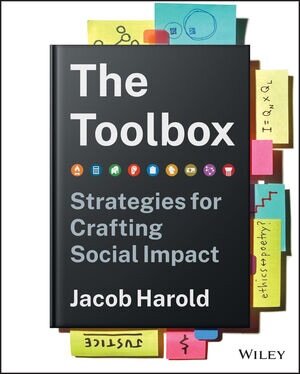The Toolbox: Strategies for Crafting Social Impact
Change is hard, even more so in a crowded world chock full of competing narratives and goals and different paths to follow, to say nothing of alternative facts. But making the world a better place was, quite likely, never a simple task. Anyone who has spent even a little time thinking about social change knows the refrain: If it were that easy, someone else would have already done it—just ask Noah. It may well be that social change makers have always seen themselves as living in perilous times, that the problems of the world—from their vantage point at least—rightly felt insurmountable, the way forward unclear, the right strategy always contested. And still, we have survived and often thrived and always found a path forward. It’s with that understanding of our past and a sober reflection on our present that Jacob Harold offers The Toolbox: Strategies for Crafting Social Impact, an incisive and densely packed owner’s manual for reaching our goals, especially when change is hard.
Harold, who began his career as a grassroots organizer and climate change campaigner, later working at the David and Lucile Packard Foundation, the Bridgespan Group, and the William and Flora Hewlett Foundation, before leading GuideStar and facilitating its merger with Foundation Center in 2021 to become Candid—where he was this reviewer’s colleague—has had a unique opportunity to see social change from many sides, and it’s that perspective that he brings to bear here. We live at what he describes as a “plastic hour”—a malleable moment, a confluence of history, science, technology, and ecology—which takes on added meaning with his anxious reminder that we dump 10 million tons of plastic waste into the oceans every year. There has never been such abundance in all of human history, nor have there been so many living in poverty; technological change is accelerating at such a pace that human psychology and the interpersonal connections that thread the fabric of society are too slow to adapt; and, as Harold puts it: “mother nature bats last,” presenting humankind with an unfathomable ecological challenge that at once demands our full attention and reifies the interconnectedness of our injustices and the insufficiency of our actions.
But Harold is no ancient mariner warning us against our transgressions—this is not a book about telling us to recycle more. Instead, the Toolbox is a work that brings together his decades of experience at the forefront of effecting social change and trying to make the world a better place. Nor is this a book about how to save the world; rather, it is an acknowledgement that “there is no single answer: there is no silver bullet.” The Toolbox is in many respects a master class in understanding what you need to know in order to know what you need to do; the nine “tools” synthesizing history, ethics, philosophy, sociology, mathematics, and economics give the reader not a blueprint for a perfect society, but the ability to articulate a vision of what that society might be and the methods for achieving those ends. The tools include storytelling (understanding the world through narrative), mathematical modelling (putting numbers to our assumptions), behavioral economics (seeing the world as it is, not as we want it to be), design thinking (placing the human user at the center of any process or challenge), community organizing (leveraging people power), game theory (aligning our own decisions with those of others), markets(orienting the primary mechanism of resource allocation), complex systems (creating a whole that is greater than the sum of its parts), and institutions (building a lasting infrastructure to effect change).
The Toolbox is in many respects a master class in understanding what you need to know in order to know what you need to do.
None of these strategies alone will be effective in isolation. Harold sees them as arrows in the quiver to be used in concert; when they are engaged with and acted upon together, they can propel action “to wield empathy for good.” Whether your strategy is to iterate toward improvement or to create a tipping point that compels social change, here, it is critical to be continuously planning, acting, and learning while moving forward. Drawing lessons from Martin Luther King, Jr.’s Letter from Birmingham Jail, Harold is acutely aware of the tension between urgency and patience—that social change might come faster or slower, that even as you follow your strategy, you need to learn from the path you are following and be prepared to turn. “Ultimately,” he writes, “strategy requires both intellectual and ethical integrity. It needs to be rooted in the clearest possible line connecting the present with a better future—a logical pathway connecting action to results.” Looking to a distant future, Harold ruminates on the billions—perhaps trillions—of people who might inhabit the earth across millennia, assuming that we survive our perilous plastic hour. And while thinking about the longer term, he is grounded in the present, reminding us that “the kind thing to do is the strategic thing to do. Our world is messy and complex and dangerous, but ultimately it is kindness that allows us to build up something better.”
Toolbox is densely written but eminently readable. And while we may not fully appreciate the mathematical modeling of Bayesian statistical analysis at first read, Harold makes sure that we can see how strategy rooted in outcomes can help inform future action. At 13 chapters, each with its own set of takeaways and spot-on lists for further reading, the book is neatly arrayed like a college course—one path a future Professor Harold might well pursue. And like a good teacher, Harold’s storytelling ability is in full view, nerdily carrying us from the Treaty of Westphalia, through the rudiments of the prisoner’s dilemma, to a poignant case study on how the Americans with Disabilities Act came to be, all the while salting his narrative with apt quotes from the likes of Hanna Arendt, Octavia E. Butler, Alvin Toffler, and Darren Walker. And like a good handbook, Toolbox is meant to be shared across the sector and read again and again.
Daniel X Matz is contributing editor at Philanthropy News Digest.








